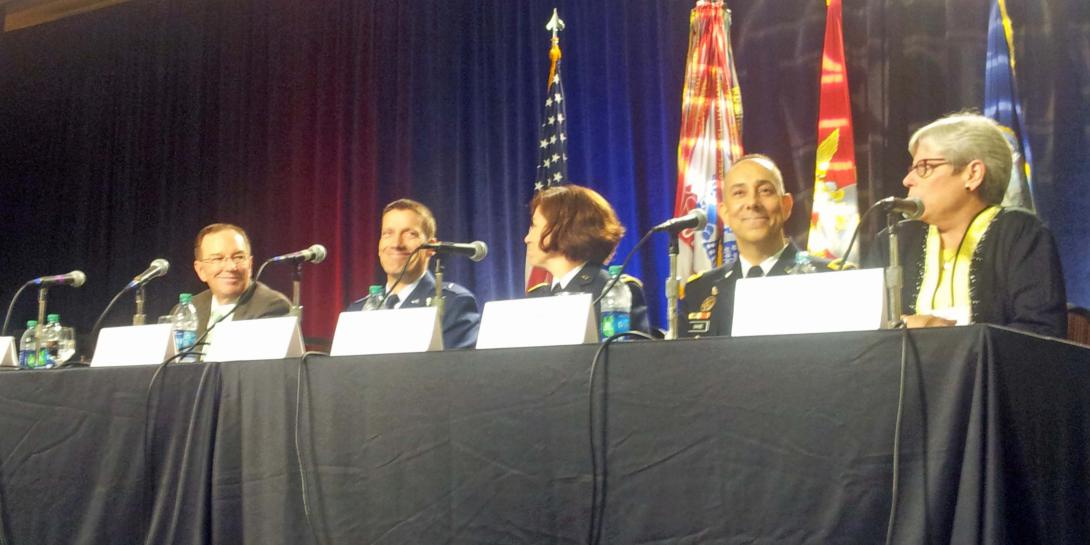Russia’s Plausible Deniability Practice May Spread
AFCEA TechNet Augusta 2016
The SIGNAL Magazine Online Show Daily, Day 1
Quote of the Day:
“What we’ve observed them do is employ the full-range of information warfare capabilities to effectively find and fix their opponents. And then they finish them with long-range fires and combined arms maneuvers.” —Maj. Gen. Stephen Fogarty, commander, U.S. Army Cyber Center of Excellence
U.S. officials within the intelligence community and elsewhere fear that other potential adversaries might learn a few lessons from Russia’s recent provocative actions, according to Maj. Gen. Bruce Crawford, USA, who commands the Army’s Communications-Electronics Command.
Gen. Crawford made the comments while serving as the luncheon keynote speaker on the first day of AFCEA’s TechNet Augusta conference taking place in Augusta, Georgia. He reminded the audience that Russia initially claimed its forces were not involved in the invasion of Crimea, blaming the violence instead on insurgents. “One of the things causing concern as you look across the intelligence community and other places is whether there will be others who are going to adopt that plausible deniability,” Gen. Crawford said.
Indeed, Russia’s presence loomed large over the first day of the conference. Lt. Gen. Ben Hodges, USA, commander, U.S. Army Europe, said the Russians have used jamming and other means to effectively counter unmanned aerial vehicles flown by the Organization for Security and Cooperation in Europe (OSCE), which monitors the situation between Russia and the Ukraine.
The United States is learning a lot about Russian capabilities from the conflict in Ukraine, he indicated. Gen. Hodges, who addressed the audience via video teleconference, reported that he recently visited Ukraine and before leaving asked a senior American official what Ukraine needed most. Without hesitation, the unnamed official replied: Secure communications.
“They are getting hammered because they do not have the ability to talk securely and everything they say... is intercepted or jammed,” Gen. Hodges said. “Russian unmanned aerial vehicles are able to fly overhead and spy on formations—things we haven’t had to worry about for the past 15 years.”
The OSCE reports that 90 percent of the violations of the cease fire violations are committed by Russian-led separatist forces, Gen. Hodges offered, adding that those forces have “made it very difficult” for the unarmed OSCE monitors to do their jobs.
Maj. Gen. Stephen Fogarty, USA, commander, Army Cyber Center of Excellence, said Russian Federation forces are using a wide array of cyber and electronic warfare capabilities. Russia detects, locates and eliminates enemy forces with those sophisticated capabilities. “What we’ve observed them do is employ the full-range of information warfare capabilities to effectively find and fix their opponents. And then they finish them with long-range fires and combined arms maneuvers,” Gen. Fogarty reported.
The former communist country’s capabilities include communications intelligence, electronic intelligence, human intelligence, geospatial intelligence, media streaming and social media exploitation. “They detect, they identify, they geolocate their adversaries, and then they fix them with very sophisticated electronic warfare and cyber attacks,” he said.
To explain how military forces can be physically fixed in place with electronic attacks, Gen. Fogarty explained that when communications are jammed, troops can receive neither direction nor support. “You can’t call for supporting fires. You can’t call for medevac. You can’t get resupplied. You don’t know where your leaders are at. You get fixed. And you become a very easy target for precision fires. They maneuver right over you with combined arms maneuvers,” Gen. Fogarty declared. “And they don’t have a multi-billion program of record to present this capability.”
The “traditional yardsticks” of power include attack helicopters, artillery and armored vehicles, he added, but the Department of Defense Information Network (DODIN) may be the most critical weapon in the arsenal, he indicated. “[W]ithout effective DODIN operations, we don’t have effective mission command, we don’t have precision fires, we don’t have joint ISR [intelligence, surveillance and reconnaissance], we don’t have joint logistics, we don’t have telemedicine,” he pointed out.
He compared the electronic warfare and cyber threat to the threat of improvised explosive devices (IEDs), which proved so deadly in Iraq and Afghanistan. “We didn’t disrupt the IED threat by walking around and trying digging up a bunch of IEDs in the ground,” Gen. Fogarty offered. “We looked at finance. We looked at the networks that reached around the globe, supply chains. We looked at it very holistically, and it took a whole of government approach to deal with that threat.”
He recommended that as the United States moves from a congested spectrum environment to one that is both congested and contested by an adversary, the military stop thinking of the network as a service and start thinking of it as a weapon system essential to military operations. “What we have observed over the last 18 months in particular is that if we continue to operate under that mindset that providing communications, providing access to the network is a service and it’s not an operation, then I think we’re going to set ourselves up for failure,” Gen. Fogarty declared.
Gen. Hodges, meanwhile, stressed the continuing need for interoperability with U.S. allies. Gone are the days, he said, when some people thought U.S. soldiers would never take orders from an allied commander. It is now commonplace for one nation’s forces to be attached to another. He recalled that a British commander in Afghanistan had thousands of U.S. soldiers under his command and yet still couldn’t be provided access to the Defense Department’s classified network. Gen. Hodges indicated that network security still sometimes takes precedence over interoperability.
During the question-and-answer session, Gen. Hodges also complained that much of the information that gets classified does not necessarily need to be classified, making it that much harder to share information with allies and other partners.






Comment
Ukraine Can Defeat The Russian Armed Forces
Obama's strategy was understandable in regards to not arming Ukraine in 2014. Merkel's and Obama's policies prevented WW III, unlike the Imperialists Powers in 1914.
Today the situation has changed, Putin is holding tight and just wants the Donbas to control the Ukrainian political dynamics.
Today NATO should arm Ukraine to be capable to withstand a the full assault of the Federal Russian Armed Forces.
Ukraine Can Defeat The Russian Armed Forces:
Adrian Bonenberger wrote this about the Ukrainian Military, which he knows intimately. He was an infantry officer in the U.S. Army from 2005-2012 and served twice in Afghanistan. He is now a freelance journalist.
http://www.forbes.com/sites/realspin/2015/07/01/ukraine-can-defeat-the-…
Russia Is Not a "Communist Country"
Thanks for the very informative report about significant capabilities the Russian armed forces have brought to bear in Ukraine. One small point: Russia is not, and has not been for over two decades, a "communist country" as you characterize it ("The communist country’s capabilities include communications intelligence, electronic intelligence, human intelligence, geospatial intelligence, media streaming and social media exploitation."). In fact, the Communist Party of the Russian Federation is an opposition party.
Sharp eye there, Mark. We
Sharp eye there, Mark. We have edited the text to reflect the current Russian government more accurately.
Comments